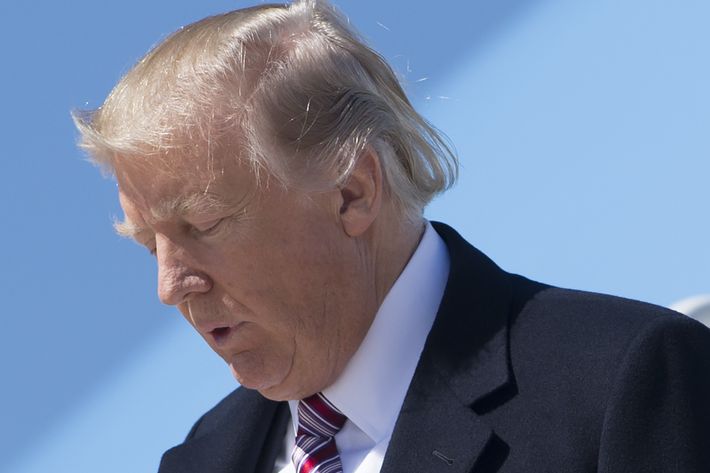
It is usually a mistake to read Donald Trump’s tweets as reflecting any course of action more considered than dyspeptic gut responses to whatever news has flashed across his face at the moment. Donald Trump’s splenetic Saturday morning tweets, alleging that Barack Obama wiretapped his phones came as a surprise to his advisers. Accusing the former president of serious crimes, and threatening legal action against him, is the sort of step that most presidents would not take without some advance planning. And indeed, not long after alleging that the former administration had consummated a Watergate-esque scheme to subvert the democratic process and destroy him, Trump was moving on to beef with the successor as host of his old reality television show.
Still, elements of a long-term strategy, accidental or otherwise, could be gleaned from the rant. The president may well have previewed the line of argument that may emerge as his primary defense.
Before this morning, Trump’s message on the Russia scandal has emphasized his innocence. He and his associates have done nothing wrong, and all the charges reflect baseless Democratic attempts to make excuses for Crooked Hillary’s sad defeat. (i.e., “Russia talk is FAKE NEWS put out by the Dems, and played up by the media, in order to mask the big election defeat and the illegal leaks!”) His new line of argument ignores the question of his own guilt or innocence and turns the accusation against his predecessor, who – he alleges – ordered his phones to be wiretapped.
The apparent source of this theory is a radio rant by right-wing talk show host Mark Levin, which was aggregated by the pro-Trump conservative ethnonationalist site Breitbart, and which (Robert Costa reports) came to the attention of the White House staff. Since wiretaps must be legally approved by a special court and would require a high standard of evidence, it is highly unlikely that Levin’s theory is correct. (Or, at least, the theory assumes an act of breathtaking illegality by Obama for which Levin has produced no evidence.) It is also fairly ironic that Trump has chosen to compare Obama to Richard Nixon and Joseph McCarthy, given that Trump was closely mentored by the key architect of McCarthy’s smear campaign, and deliberately patterned his own campaign on Nixon’s.
But intellectual coherence or consistency are not baseline requirements for the messaging task Trump needs. If the Russia scandal continues to produce revelations of unethical or unpatriotic behavior by his campaign, he will need a response that can rally the conservative base behind him (and thus make Republicans in Congress reluctant to support independent investigations or even impeachment proceedings.) Turning the charge against Obama does that for him. It reframes the issue as a matter of the hated Obama abusing his power to discredit Trump. Any information flowing from the scandal is therefore presumptively tainted by its association with the former president.
The benefit of this line of reasoning is that it does not require conservatives to actually defend Trump’s behavior. All that’s needed is for their distrust of Obama to overcome their misgivings about Trump – a condition that describes virtually the entire Republican base. Notably, Mark Levin himself had lined up behind Ted Cruz against Trump during the presidential primary, calling Trump’s attacks on Cruz “Nixonian” and – even using the strongest rebuke in the conservative movement lexicon – “Alinskyite.” Now Levin is back on the team and, having forgotten his earlier diagnosis of Trump’s character and honesty, redirecting his anger against the Democrats. Conveniently for Trump, while unifying his base, attacking the alleged crimes of Obama also attracts support from left-wing sources like the Nation and the Intercept, which have consistently dismissed the Russia scandal as “neo-McCarthyism.”
A crucial element to Trump’s success during the campaign was his ability to position himself as an insurgent, marshalling the support of Americans who had a wide range of discontent with the status quo under a single anti-establishment candidacy. Every populist who wins an election has to deal with the tricky problem of converting a political style that requires a lack of power or responsibility to the condition of having both. By making himself a victim of Obama’s alleged abuses of power, Trump revives and extends his status as insurgent indefinitely. The most powerful person on Earth will remain the victim of a conspiracy so vast.